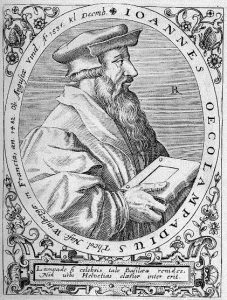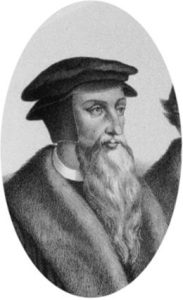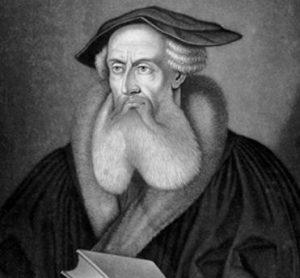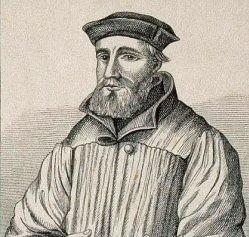Under the influence of Humanism
Johannes Husschin, or Huszgen, called Oekolampad, was born in 1482, to a wealthy bourgeois family in Weinsberg, Swabia. He studied law in Bologna and then theology in Heidelberg.
In 1510 he was ordained as a priest and became a preacher in his home-town. As such, he was able to take holidays during which he perfected his knowledge of Greek and Hebrew. He met Erasmus and collaborated with him on the publication of the New Testament in Greek. Influenced by Humanists, he Hellenized his name and transposed it into Okolampadius (light of the house). In addition, he translated the Church Fathers and continued studying theology in Tübingen, Heidelberg and Basel, where he got his doctorate in 1518.
In 1518 he was appointed preacher at Augsburg cathedral. He was involved in arguments over Luther’s writings. In favour of Reform ideas, he did not wish to secede from the Church and entered a convent near Augsburg in 1520. He could not stay there because he supported Luther, and left the convent in 1522.
The Reformer of Basel
When he arrived in Basel, Oekolampad was very involved in the Reform Movement. In 1523 he was asked to teach theology at the university and in 1525 was appointed pastor at Saint-Martin’s Church.
In 1529 he officially introduced the Protestant Reformation in Basel. He organised the Church and ensured a significant role for lay people, but he never achieved his desire to separate Church and State.
His preaching and his numerous commentaries on the Bible, many of which were published, made him famous in Basel and elsewhere. He published works on Isaiah, as well as on the Epistle to the Romans, on Malachi, Jeremiah and Ezekiel.
Along with Martin Bucer, Oekolampad helped spread Reformation in Southern Germany, particularly in Ulm.
An advocate of the Reform Movement
Like Zwingli, Oekolampad advocated the symbolical presence of Christ in the Eucharist and disagreed with the Lutherans who believed in the actual presence of Christ.
In 1529 he took part in the Marburg Colloquy with Martin Bucer, in an attempt to close the gap between the Reformers and the Lutherans but the two branches of Protestantism remained divided.
In 1531 Oekolampad, aged 49, died in Basel two months after Zwingli.
The Protestant theologian and physician Wolfgang Capiton (1487-1541) wrote a biography of Oekolampad.






